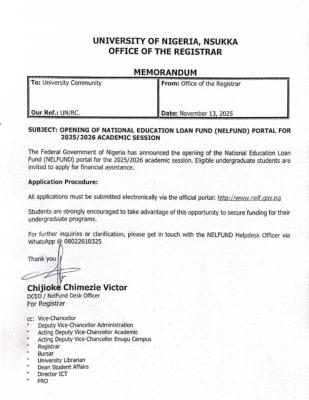The University of Nigeria, Nsukka (UNN) has officially announced the opening of the National Education Loan Fund (NELFUND) portal for the 2025/2026 academic session. The initiative, spearheaded by the federal government, aims to provide financial assistance to students across Nigerian universities, enabling access to quality education and easing the financial burden associated with tertiary education.
This announcement comes at a crucial time as many students struggle to meet tuition and other academic expenses, particularly in public universities where funding challenges are persistent. NELFUND’s renewed portal offers a lifeline, promising to support academically qualified students with the resources needed to pursue their studies without interruption.
Understanding the National Education Loan Fund (NELFUND)
The National Education Loan Fund (NELFUND) is a federal government scheme designed to provide financial support to undergraduate students in Nigerian universities and higher institutions. The program aims to reduce financial barriers, promote academic excellence, and enhance student retention in tertiary institutions. By offering accessible and manageable loan options, NELFUND is strategically positioned to assist students who demonstrate financial need and academic potential.
Key Objectives of NELFUND:
- Facilitate Access to Higher Education: Provide financial support to deserving students to cover tuition and academic-related expenses.
- Promote Academic Excellence: Encourage students to excel academically by alleviating financial stress.
- Enhance Retention Rates: Reduce dropout rates caused by financial constraints, ensuring students complete their programs.
- Support Equity and Inclusion: Prioritize students from economically disadvantaged backgrounds, ensuring education remains accessible to all.
Eligibility Criteria for Applicants
While the portal is now open, prospective applicants are advised to ensure they meet the following eligibility requirements before submitting their applications:
- Undergraduate Status: Applicants must be full-time undergraduate students in accredited Nigerian universities.
- Academic Standing: Students must demonstrate satisfactory academic performance, typically verified through their institution’s records.
- Financial Need: Applicants should provide evidence of financial constraints that hinder their ability to fund their education independently.
- Good Conduct: Students with records of disciplinary issues may be disqualified from the loan scheme.
- Documentation: Accurate personal, academic, and institutional information is required to complete the application process successfully.
Students are strongly encouraged to review these criteria carefully to avoid disqualification.
How to Apply for NELFUND
The NELFUND application process has been designed to be straightforward and accessible. To ensure successful application, students should follow these steps carefully:
- Portal Registration: Students must create an account on the official NELFUND portal and provide accurate personal information.
- Profile Completion: Fill out all required fields, including academic records, financial information, and institutional details.
- Document Upload: Upload any necessary supporting documents, such as proof of admission, academic transcripts, and evidence of financial need.
- Application Review: Review the application thoroughly before submission to ensure all information is correct.
- Submission and Confirmation: Submit the application and retain the confirmation details for future reference.
Applicants are urged to apply as early as possible to avoid last-minute complications and potential delays in processing.
Why This Announcement Is Critical for Nigerian Students
The opening of the NELFUND portal represents a significant opportunity for thousands of Nigerian students who face financial challenges in completing their tertiary education. The initiative comes at a time when tuition fees and academic costs are rising, and financial support from families may be limited.
Key Benefits of NELFUND:
- Financial Relief: Covers tuition and other academic-related expenses, reducing the burden on students and their families.
- Increased Access: Expands opportunities for students from economically disadvantaged backgrounds to pursue higher education.
- Academic Focus: Allows students to concentrate on their studies without worrying about financial constraints.
- Empowerment: Prepares students for future success by supporting uninterrupted education.
Conclusion
As applications open, the pressing question remains: Will the portal reach all deserving students efficiently, and will the disbursement process be timely enough to make a meaningful impact on the academic session? These are critical considerations for students, policymakers, and educational stakeholders alike.



